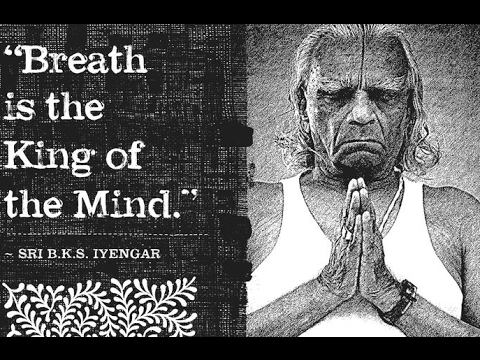Our mind or consciousness is always buzzing with thoughts, fears, anxieties, and dreams. There is always a constant influx of impressions on the mirror of our awareness. Sometimes all we want is to have some quiet and calmness. In certain situations when by coincidence we manage to become thoughtless, we experience an incredible lightness. We feel happy and moving with the flow of life. Everything becomes smooth, the outside world doesn’t seem to bother our minds anymore. But if we observe carefully, we see our breath is very light during such times. In fact, our breathing is imperceptible.
What if I tell you that Yogis had found the link between breath retention and our mind? That by practicing breath retention through pranayama we can in fact control our minds and our life.
Mention in Scriptures of Breath Retention
In chapter 2 of Hatha Pradipika Swatmara writes about the magical powers of breath retention:

Translation 1: “When prana moves, chitta (the mental force) moves. When prana is without movement, chitta is without movement. By this (steadiness of prana) the yogi attains steadiness and should thus restrain the vayu (air)” [1].
Translation 2: “Respiration being disturbed, the mind becomes disturbed. By restraining respiration, the Yogi gets steadiness of mind” [2].

Breath and The Mind are Linked
As we can see from the above verse, the yogis had figured out that the breath and the mind are linked. If one is disturbed, then the other also gets disturbed. But when the mind or the breath is balanced, the other automatically gets balanced or calmed.
There are different schools of thought in Yoga about breath retention. The two most prominent are:
Hatha Yoga: It says control the breath or prana and the mind will automatically be controlled.
Raja Yoga: It says control the mind and the breath or prana (vital energies) are automatically controlled.
In Buddhist Literature and across many other contemplative kinds of literature you must have come across this analogy that the mind is like a wild monkey. It likes to jump around from one place to another. Because of this, it is very difficult to control the mind and make it still.
But Hatha Yogis say let the mind be as it is, leave it. Don’t directly jump on trying to control it, because it is a very difficult thing to do. If it is in its nature to wander, then trying to control the mind through exerting conscious will-power of the mind is a challenging thing.
Hatha Yoga wants you to focus instead on the breath and other autonomic body functions. By concentrating and regulating them, the mind will atomically quiet down.
Our breathing is directly connected to our brain and our central nervous system. It also has a link with our hypothalamus [1]. The hypothalamus plays an important role in our emotional response.
“Lateral parts of the hypothalamus are involved in emotions such as pleasure and rage, while the median part is associated with aversion, displeasure, and a tendency to uncontrollable and loud laughing” [2].
The other role of the hypothalamus is in cognition. Irregular breathing will send erratic impulses to this center and thus adversely affect our cognition and emotions.
Also, in our nose certain regions of the nasal mucous membrane are connected to the visceral organs in our body (soft internal organs of the body) like the heart, liver, and lungs. When the impulses through the nose are irregular, these visceral organs (specifically those connected through the coccygeal plexus) also get disturbed [1].
This causes imbalance and disturbances in the body.
Thus, by controlling the breath, the whole human body can be controlled.
In the next article, we will learn about the importance of using Pranayama for breath control.
References
- Book: Hatha Yoga Pradipika commentary by Swami Muktabodhananda.
- (All the verse translations in the article are by Pancham Sinh) Book: Hatha Yoga Pradipika Translated by Pancham Sinh.
- Research Paper: Hypothalamic modulation of breathing [link]

1 thought on “Mind control through breath retention”